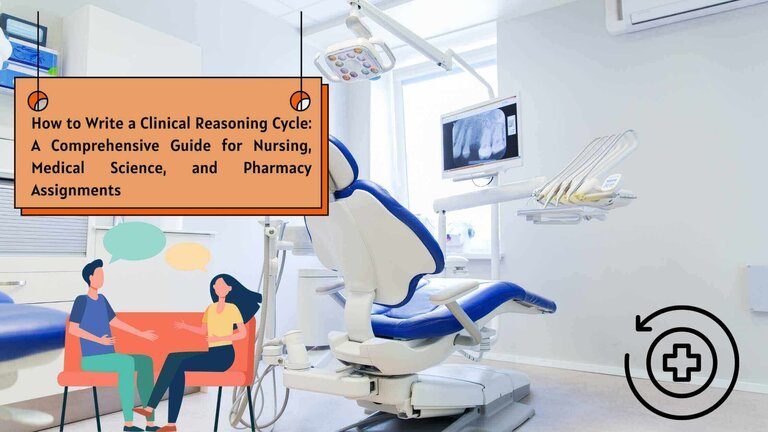
If you're a medical or nursing student, you've probably heard the term "clinical reasoning" thrown around a lot. But what does it actually mean? Clinical reasoning is the complex process that healthcare professionals use to gather and interpret patient data, make diagnoses, and formulate treatment plans. It's a skill that's developed through education, training, and experience.
Listen To This Blog
What is Clinical Reasoning and Why is it Important?
Clinical reasoning is the complex cognitive process that healthcare professionals use to gather and interpret patient data, make diagnoses, and formulate treatment plans. It is a skill that is developed through education, training, and experience.
Clinical reasoning is essential for providing safe and effective patient care. It allows healthcare professionals to think critically about their patients' cases and to make informed decisions about their treatment.
The clinical reasoning cycle is a four-phase process that healthcare professionals use to make clinical decisions:
- Data gathering: This involves collecting information about the patient, such as their medical history, physical examination findings, and laboratory results.
- Problem identification: This involves identifying the patient's problems or concerns.
- Hypothesis generation: This involves developing hypotheses about the patient's problems.
- Testing and refinement: This involves testing the hypotheses and refining them as needed.
The clinical reasoning cycle is an iterative process, meaning that healthcare professionals may go back and forth between the different phases as they learn more about the patient.
Advantages of Clinical Reasoning
Clinical reasoning is the complex cognitive process that healthcare professionals use to gather and interpret patient data, make diagnoses, and formulate treatment plans. It is a skill that is developed through education, training, and experience.
There are many benefits to clinical reasoning, including:
- Improved patient outcomes: Clinical reasoning helps healthcare professionals to make more accurate diagnoses and to develop more effective treatment plans. This can lead to improved patient outcomes.
- Increased patient satisfaction: Patients are more likely to be satisfied with their care if they feel that their healthcare providers are thinking critically about their cases and making informed decisions about their treatment.
- Reduced medical errors: Clinical reasoning helps healthcare professionals to avoid making mistakes. This can lead to a reduction in medical errors.
- Increased professional satisfaction: Clinical reasoning is a challenging but rewarding skill to develop. Healthcare professionals who are skilled in clinical reasoning often report feeling more satisfied with their careers.
In addition to these general benefits, clinical reasoning can also lead to specific benefits for different types of healthcare professionals. For example, nurses with strong clinical reasoning skills are better able to identify and respond to changes in patient condition. Doctors with strong clinical reasoning skills are better able to make complex diagnoses and develop individualized treatment plans. And physical therapists with strong clinical reasoning skills are better able to design and implement effective rehabilitation programs.
Overall, clinical reasoning is an essential skill for all healthcare professionals. It allows them to provide safe and effective patient care, improve patient outcomes, and increase professional satisfaction.
Stages in the Clinical Reasoning Cycle
The clinical reasoning cycle is a four-phase process that healthcare professionals use to make clinical decisions. The four phases are:
- Data gathering
- Problem identification
- Hypothesis generation
- Testing and refinement
The clinical reasoning cycle is an iterative process, meaning that healthcare professionals may go back and forth between the different phases as they learn more about the patient.
Data gathering
The first step in the clinical reasoning cycle is to gather data about the patient. This data can come from a variety of sources, such as the patient's medical history, physical examination findings, laboratory results, and imaging studies.
Problem identification
Once the healthcare professional has gathered data about the patient, they need to identify the patient's problems or concerns. This may involve asking the patient questions, reviewing their medical history, and interpreting their laboratory results.
Hypothesis generation
Once the healthcare professional has identified the patient's problems or concerns, they need to develop hypotheses about the patient's diagnosis. This involves considering the data they have gathered about the patient and their knowledge of medicine and disease.
Testing and refinement
Once the healthcare professional has generated hypotheses about the patient's diagnosis, they need to test the hypotheses and refine them as needed. This may involve ordering additional tests, performing a physical examination, or consulting with other healthcare professionals.
The clinical reasoning cycle is a complex process, but it is essential for healthcare professionals who want to provide safe and effective patient care. By following the clinical reasoning cycle, healthcare professionals can make informed decisions about their patients' care and improve patient outcomes.
Conclusion
In conclusion, the Clinical Reasoning Cycle stands as a foundational framework in the realm of healthcare and medical practice. It empowers professionals to navigate the complexities of patient care with precision and compassion, guiding them through a systematic process of assessment, analysis, and decision-making. By embracing the phases of this cycle, healthcare practitioners ensure that their clinical judgments are well-informed and patient-centric. The Clinical Reasoning Cycle fosters the development of critical thinking skills and cultivates a deep understanding of the intricacies of healthcare delivery. As we continue to advance in the field of medicine, the Clinical Reasoning Cycle remains an indispensable tool, helping professionals deliver the highest quality of care while upholding the core principles of empathy and evidence-based practice.

